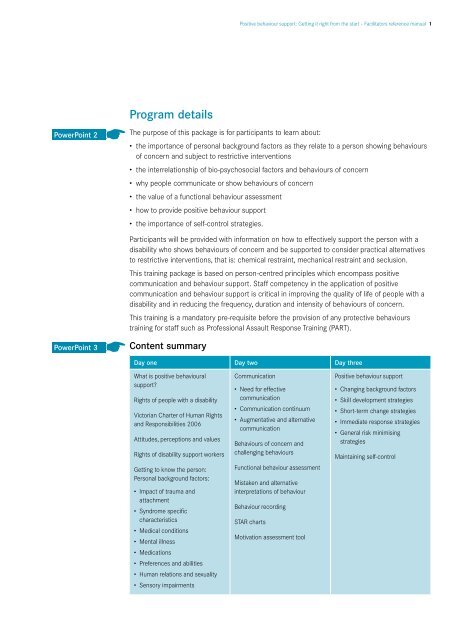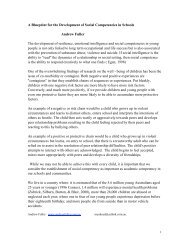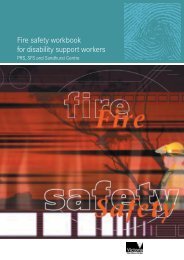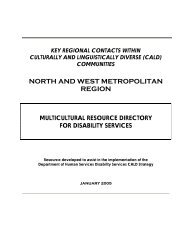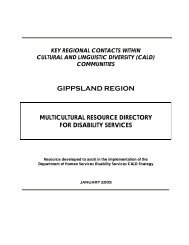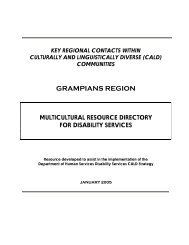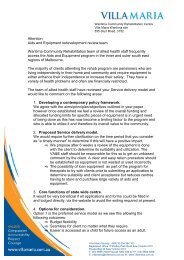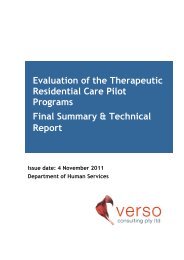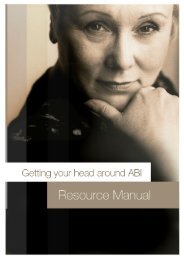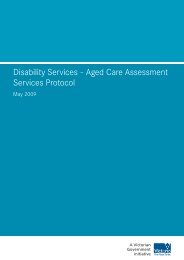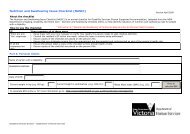Positive Behaviour Support - Department of Human Services - Vic ...
Positive Behaviour Support - Department of Human Services - Vic ...
Positive Behaviour Support - Department of Human Services - Vic ...
You also want an ePaper? Increase the reach of your titles
YUMPU automatically turns print PDFs into web optimized ePapers that Google loves.
PowerPoint 2<br />
PowerPoint 3<br />
*<br />
*<br />
Program details<br />
<strong>Positive</strong> behaviour support: Getting it right from the start - Facilitators reference manual 1<br />
The purpose <strong>of</strong> this package is for participants to learn about:<br />
• the importance <strong>of</strong> personal background factors as they relate to a person showing behaviours<br />
<strong>of</strong> concern and subject to restrictive interventions<br />
• the interrelationship <strong>of</strong> bio-psychosocial factors and behaviours <strong>of</strong> concern<br />
• why people communicate or show behaviours <strong>of</strong> concern<br />
• the value <strong>of</strong> a functional behaviour assessment<br />
• how to provide positive behaviour support<br />
• the importance <strong>of</strong> self-control strategies.<br />
Participants will be provided with information on how to effectively support the person with a<br />
disability who shows behaviours <strong>of</strong> concern and be supported to consider practical alternatives<br />
to restrictive interventions, that is: chemical restraint, mechanical restraint and seclusion.<br />
This training package is based on person-centred principles which encompass positive<br />
communication and behaviour support. Staff competency in the application <strong>of</strong> positive<br />
communication and behaviour support is critical in improving the quality <strong>of</strong> life <strong>of</strong> people with a<br />
disability and in reducing the frequency, duration and intensity <strong>of</strong> behaviours <strong>of</strong> concern.<br />
This training is a mandatory pre-requisite before the provision <strong>of</strong> any protective behaviours<br />
training for staff such as Pr<strong>of</strong>essional Assault Response Training (PART).<br />
Content summary<br />
Day one Day two Day three<br />
What is positive behavioural<br />
support?<br />
Rights <strong>of</strong> people with a disability<br />
<strong>Vic</strong>torian Charter <strong>of</strong> <strong>Human</strong> Rights<br />
and Responsibilities 2006<br />
Attitudes, perceptions and values<br />
Rights <strong>of</strong> disability support workers<br />
Getting to know the person:<br />
Personal background factors:<br />
• Impact <strong>of</strong> trauma and<br />
attachment<br />
• Syndrome specific<br />
characteristics<br />
• Medical conditions<br />
• Mental illness<br />
• Medications<br />
• Preferences and abilities<br />
• <strong>Human</strong> relations and sexuality<br />
• Sensory impairments<br />
Communication<br />
• Need for effective<br />
communication<br />
• Communication continuum<br />
• Augmentative and alternative<br />
communication<br />
<strong>Behaviour</strong>s <strong>of</strong> concern and<br />
challenging behaviours<br />
Functional behaviour assessment<br />
Mistaken and alternative<br />
interpretations <strong>of</strong> behaviour<br />
<strong>Behaviour</strong> recording<br />
STAR charts<br />
Motivation assessment tool<br />
<strong>Positive</strong> behaviour support<br />
• Changing background factors<br />
• Skill development strategies<br />
• Short-term change strategies<br />
• Immediate response strategies<br />
• General risk minimising<br />
strategies<br />
Maintaining self-control


